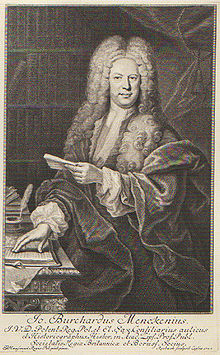Johann Burckhardt Mencke
Johann Burckhardt Mencke (pseudonym: Philander von der Linde ; also: Johann Burkhard or Johann Burchard; * April 8, 1674 in Leipzig ; † April 1, 1732 ibid) was a German scholar, historian and poet.
Life
He was the son of the Leipzig ethics and politics professor Otto Mencke . Johann Burckhardt Mencke married Katharina Margaretha Gleditsch (1684–1732) from the Gleditsch bookseller dynasty in 1702. Their son was the lawyer Friedrich Otto Mencke .
Mencke attended the Leipzig Nikolaischule , studied philosophy and theology and graduated in 1694 with a Magister Artium . He then traveled through the Netherlands, France and England. As the successor to Adam Rechenberg , he received the professorship in history at the University of Leipzig in 1699 . At the same time he studied law at the University of Halle and graduated in 1701 with a doctorate. Nevertheless, he did not change to the law faculty, but kept the chair of history at the philosophy faculty. Between 1707 and 1729 he was rector of Leipzig University for six terms.
After his father Otto Mencke's death in 1707 he took over the editing of the magazine Acta Eruditorum , from 1715 he also published the new newspapers of learned things . He wrote poetry under the pseudonym Philander von der Linde. He was the patron of the Görlitzer Poetengesellschaft, founded in 1697, and from 1717 head of the "Teutschübenden poetic society" in Leipzig, from which the German Society emerged in 1727 under Johann Christoph Gottsched . He also made himself known by publishing the "Scriptores rerum Germanicarum praecipue Saxonicarum" (Leipzig 1728-30, 3 vols.).
Mencke was appointed electoral Saxon historiographer (as successor to Wilhelm Ernst Tentzel ) in 1708 and was appointed to the royal Polish council the following year. From 1723 he carried the title of Hofrat. He was a representative of the University of Leipzig at the assembly of the Saxon state estates (Landtag). In 1726 he was accepted as a foreign member of the Royal Prussian Society of Sciences .
He introduced the word charlatan into the German language.
Works (selection)
- 1711: Schediasma De Commentariis Historicis, Qvos Galli Memoires Vocant ( digitized version )
- 1713/1715: De charlataneria eruditorum
- from 1715: New newspapers on learned things (later as Compendioses learned lexicon )
literature
- Heinrich Theodor Flathe : Mencke, Johann Burchard . In: Allgemeine Deutsche Biographie (ADB). Volume 21, Duncker & Humblot, Leipzig 1885, p. 310 f.
- Notker Hammerstein: Mencke, Johann Burchard. In: New German Biography (NDB). Volume 17, Duncker & Humblot, Berlin 1994, ISBN 3-428-00198-2 , p. 34 f. ( Digitized version ).
- Estate of the Mencke family in the Oldenburg State Archives, adult 110
Web links
- Publications by and about Johann Burckhardt Mencke in VD 17 .
- Publications by and about Johann Burckhardt Mencke in VD 18 .
- http://www.zedleriana.de/zredmencke.htm - Johann Burckhardt Mencke (by Christof J. Heymann)
- http://www.uni-leipzig.de/~agintern/uni600/ug142.htm - The Mencke family of scholars
- Works (PDF file; 41 kB)
- Literature (PDF file; 41 kB)
- Johann Burckhardt Mencke in the professorial catalog of the University of Leipzig
Individual evidence
- ^ Members of the previous academies. Johann Burchard Mencke (n). Berlin-Brandenburg Academy of Sciences and Humanities , accessed on May 6, 2015 .
| personal data | |
|---|---|
| SURNAME | Mencke, Johann Burckhardt |
| ALTERNATIVE NAMES | Philander von der Linde; Menckenius, Iohannes Burchardus |
| BRIEF DESCRIPTION | German lawyer and historian |
| DATE OF BIRTH | April 8, 1674 |
| PLACE OF BIRTH | Leipzig |
| DATE OF DEATH | April 1, 1732 |
| Place of death | Leipzig |
